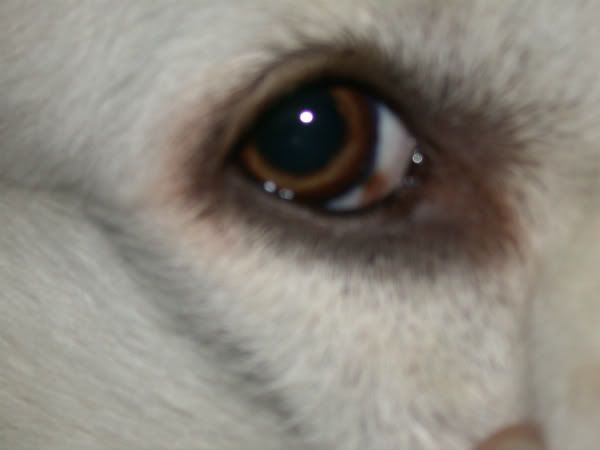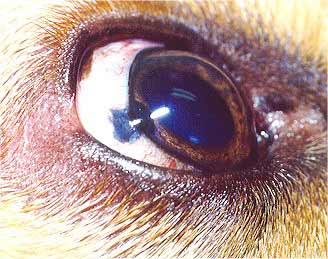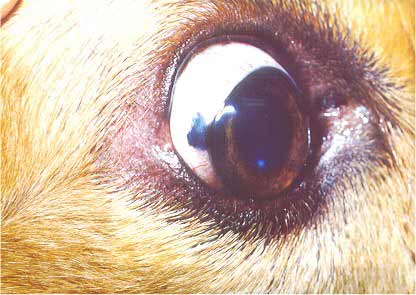Hello Katie,
Thank you for getting in touch with Experthelp.com. I have experienced this kind of discoloration on one of my dogs before and I might be able to help. There are actually different kinds of eye discoloration problems on canines but I think what you are referring to is a spot that has a brown color on the white side of the eye (sclera). The sclera is the part of the eye commonly known as the “white.” It forms the supporting wall of the eyeball, and is continuous with the clear cornea.
Here is an example which was the same for my dog:

Take note that this discoloration may or may not affect the dogs behaviour but may also need to be observed by a vet for any changes. It could be a harmless spot which was the case for my dog. They are like moles, sun spots, or freckles and are not harmful unless they are fibrous. Another case of this is a Melanoma Tumor in a Dog which is different from my case but may need immediate attention.
Another symptom of this spot or discoloration can also be a Melanoma. Melanoma tumors in dogs, more than most cancers, demand immediate attention. In fact, early recognition of these malignant tumors of melanocytes can lead to more successful attempts at removal and identification of the grade or stage of cancer.


melanomas can be either benign or malignant. The risk of metastasis for benign forms of melanoma is not very high but these can be locally invasive. Malignant melanomas, conversely, can metastasize (spread) to any area of the body especially the lymph nodes and lungs and present very challenging and dangerous prospects for the dog.
Benign Melanomas
Benign cutaneous melanomas of dogs are usually seen as round, firm, raised, darkly pigmented masses from one-quarter to 2 inches in diameter. They occur most often on the head, digits or back.
Malignant Melanomas
Lymph node swelling or enlargement may be a clinical sign of malignant spread of a melanoma. An abnormally concentrated amount of melanin (pigment) is often another hallmark of melanomas. However, some melanomas do not display the characteristic darkly pigmented color of most melanomas.
IMPORTANT:
If you discover a darkly pigmented, raised, thickened growth anywhere on your dog, be sure to have your veterinarian evaluate it. Keep in mind that pigmented (black) areas of the skin are common in dogs (and cats), especially in the tongue, gum and eyelid tissues -- these darkened areas may be completely normal for that individual. However, if any darkly pigmented areas are actually raised above the normal surface or seem thickened or ulcerated or inflamed, an exam is indicated. A definitive diagnosis is made via microscopic analysis (histopathology evaluation by a Specialist in Veterinary Pathology) of a small section of the growth. Also called a tumor biopsy, the examining pathologist usually will grade the specimen according to how actively the cells are replicating. This gives an approximation of how likely the growth is to invade and spread.
I hope your dog is okay and the answer will help you have an idea and its still better to have the dog checked physically by a specialist just in case.
Please let me know if you are already satisfied with the answer or have additional questions by replying to this message. I will be waiting for your response. Thanks.


